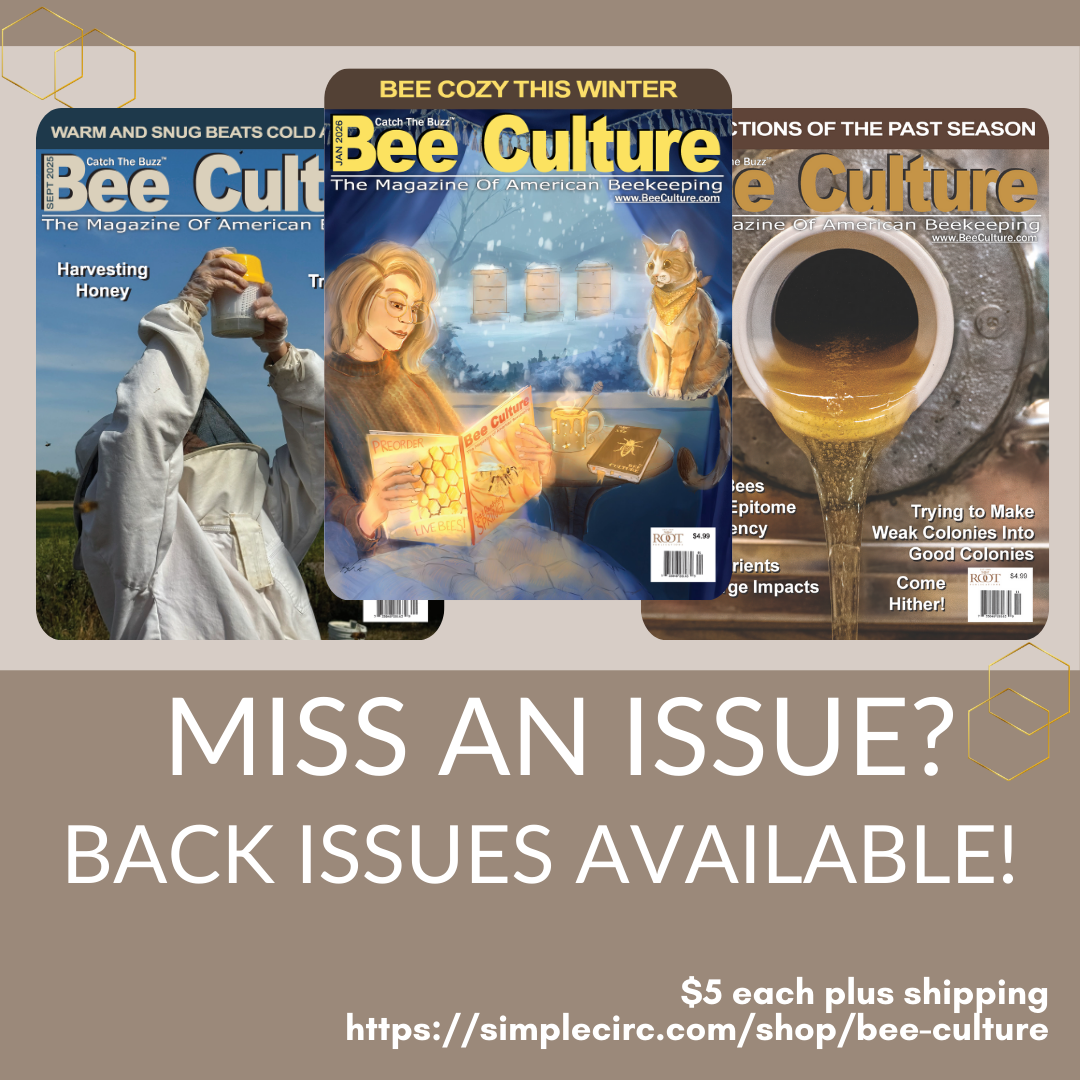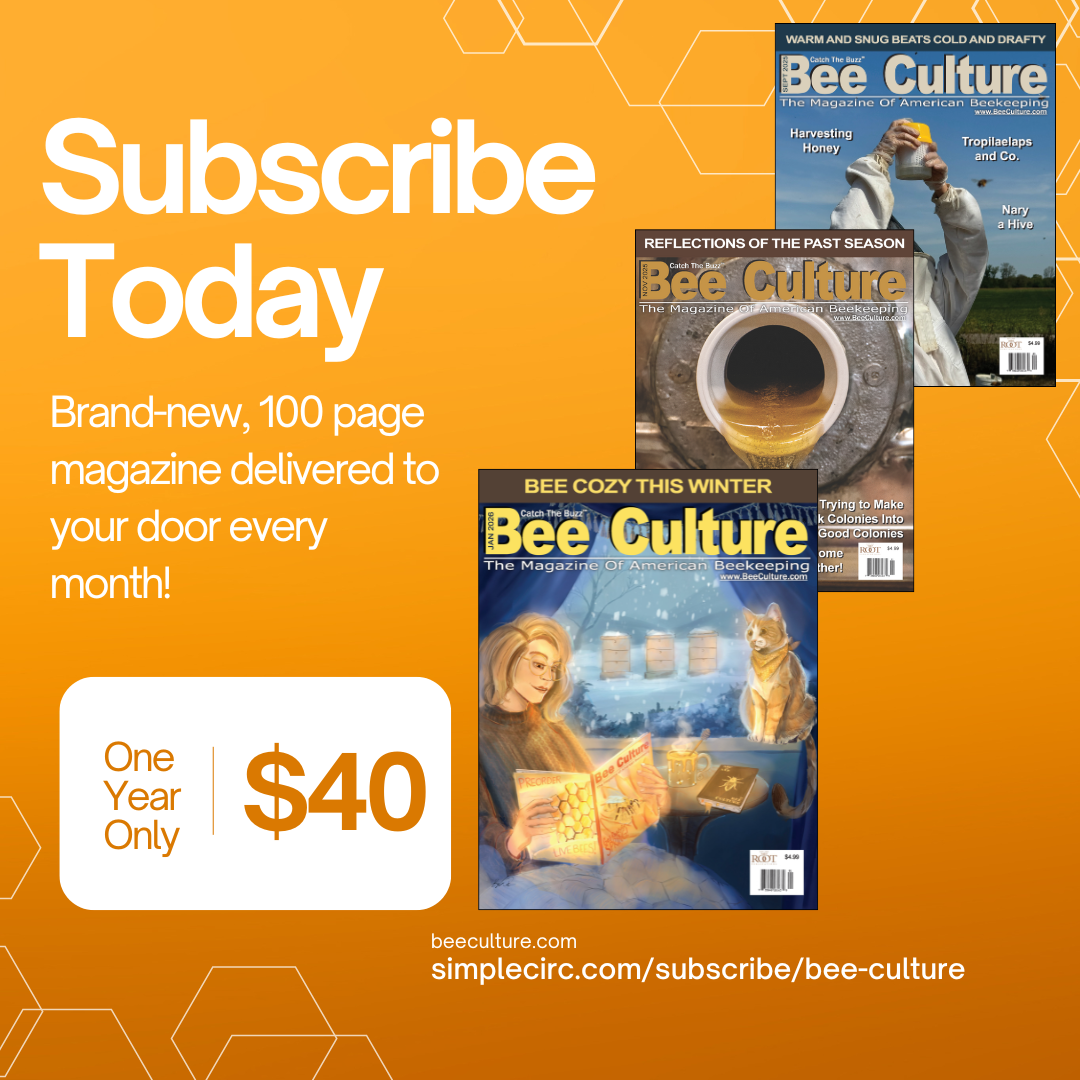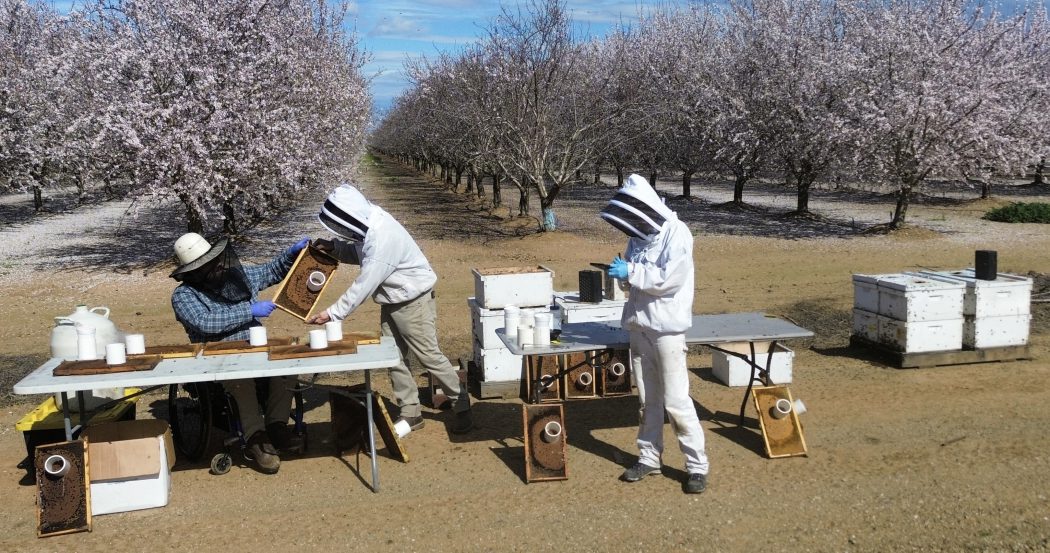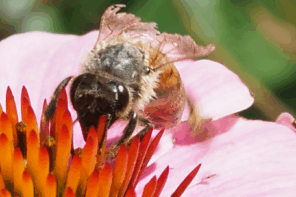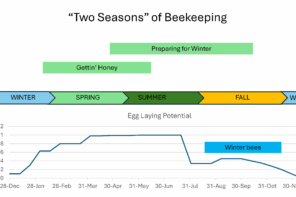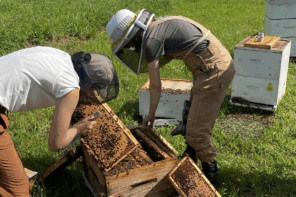The UC Davis Series
By: Elina L. Niño
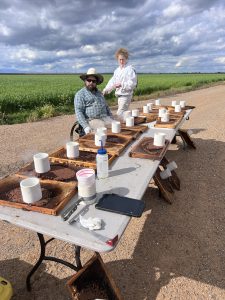
Hygienic behavior assay: UC Davis field specialist Rob and Catherine patiently waiting for brood to perish so the brood frames can be placed back in the colonies for 24 hours. The following day, they will count the number of uncapped brood cells with fully or partially removed brood to calculate the percent hygienic score. Photo by Matthew Hoepfinger, UCD.
At the time of my writing, we are almost at the end of almond bloom (and, as I recently learned, nearing the end of blueberry bloom in the Valley as well), meaning we might actually get an opportunity to briefly rest before we tackle new projects in the following months. And as much as we get very excited about doing bee research in different crops, this year we are all just a little bit more excited about the brand-new effort taking shape within the UC Davis Bee Program. We are pleased to announce the “grand opening” of the UC Davis Bee Health Hub!
Discussions and preparations for the creation of the Bee Health Hub have been underway for a couple of years now, and a part of the infrastructure has been supported by a donation from KIND Snacks. However, an unexpected need to offer beekeepers specific services has accelerated the opening of the Hub operations and we are thrilled to have been able to address immediate needs of California beekeepers. In addition to beekeepers, we are aiming to offer services to other relevant groups, so read on to see if we can be of help to you as well.
My colleague Dr. Neal Williams (UC Davis) and I have been working with various commodity groups for approximately 15 years. This has allowed us to directly assess the needs of a number of different stakeholders so we are well poised to provide the services needed by California beekeepers, other managed bee farmers, growers, land managers, pest control advisers, pesticide applicators, homeowners, home gardeners, private companies, etc. We are diligently working on expanding Bee Health Hub offerings, but this particular Spring we have been working with over a dozen California beekeepers with specific goals in mind. I think this is also a perfect place to introduce our bee health field specialist team. But before I do that, I want to highlight that we would not have been able to jump into action so quickly when the need arose, without our amazing IT/management team Wendy Mather and Kian Nikzad who will be featured more prominently in the future issues.
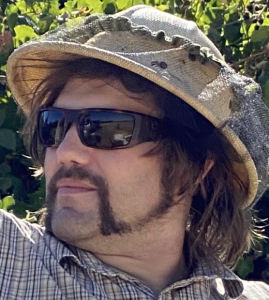
Rob Snyder (UCD Bee Health Hub Field Specialist)
Now back to our field specialists! Robert Snyder is our senior field specialist and has been working with honey bees and beekeepers for close to 20 years. I first met Rob a long time ago at one of the American Beekeeping Federation conferences in Pennsylvania while he was an apiary inspector there. Rob has a wealth of beekeeping knowledge from years of first-hand experience and he is more than happy to put that knowledge into practical advice for beekeepers. Rob was also one of the original BIP tech team members and has been crucial in developing several bee health and disease and beekeeping guides.
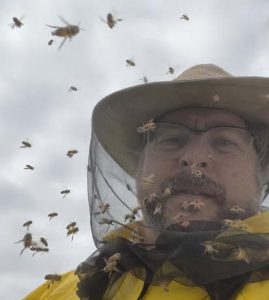
Matt Hoepfinger (UCD Bee Health Hub Field Specialist)
Matthew Hoepfinger has a slightly more eclectic background. In his previous life, he was a software engineer and began working with bees around 15 years ago. He has been involved in the Colorado beekeeping community just as long and played a major role in establishing Colorado Professional Beekeepers Association. In the past six years, he has been an integral part of the Northern California BIP tech team together with Rob, and has tirelessly worked with California beekeepers (and many others across the country) to provide essential services. Matt and Rob are both eager to continue providing consulting, sampling, testing and data analysis services to beekeepers.
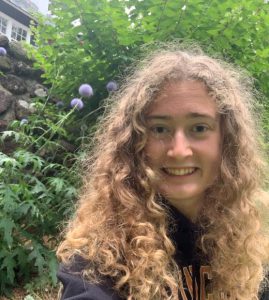
Catherine Crosier (UCD Bee Health Hub Field Specialist)
Catherine Crosier is the newest member of our team. She joined us in February of this year and has truly hit the ground running – I don’t think that she spent a full 48 hours in Davis before she headed out to assist Rob and Matt in the field. Before joining us, Catherine worked as a student researcher in Dr. Scott McArt’s lab (Cornell University) and, later on, as a technician on the NYS Beekeeper Tech Team, then briefly as a BIP tech team member. She makes sure to take every opportunity to learn from other field specialists and most importantly, the beekeepers she serves. We are thrilled to have Catherine on our team and her positive energy and passion for bees and beekeeping are contagious. All three of them have been traveling around California since early February working with beekeepers across California’s Central Valley and further North above Chico.
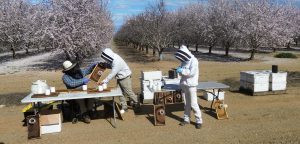
UC Davis field specialists Rob and Catherine, and a participating beekeeper, performing the hygienic test assay on potential breeder colonies. Photo by Matthew Hoepfinger, UCD.
Despite the weather throwing a wrench or two in our schedule, we are happy to say that our field specialist team has been BUSY! This Spring, we had an opportunity to serve 15 beekeepers across California representing over 500 colonies. Of course, the most common question we get from the beekeepers is: “Well how do the colonies look so far?” We are still working on putting together a full (and fully anonymized report!) which will provide information on various colony health parameters across California beekeeping operations. However, we can tell you that so far our team has found mostly zero to very low Nosema spore counts, specifically levels below the still often cited one million spores/bee threshold, and levels lower than the last year averages as experienced by the team. The team has also completed a number of Varroa mite washes and found an overall relatively low mite count averaging ~2.5 mites per ½ cup of bees (if we presume that the ½ cup has about 300 bees, this comes out to approximately 0.8% infestation). These are fairly low mite levels across the board with only a few individual colony exceptions testing slightly higher. In terms of those beekeepers using our hygienic testing services, they have reported they are very pleased with the improved hygienic scores that their breeder colonies are putting out promising a great queen rearing season! The field specialist team has clearly done an exceptional job this Spring as we have several beekeepers already signed up for follow-up field visits.
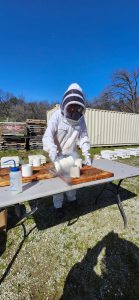
Field Specialist Catherine performing the initial steps of the hygienic behavior assay. Photo by Rob Snyder, UCD.
Prior to launching the Bee Health Hub, we went straight to the source and asked the beekeepers to let us know which types of services they would benefit from. Response was overwhelmingly in favor of the classics such as hygienic testing (freeze-killed brood) assay, sampling for Vairimorpha (Nosema) spp. presence in colonies, Varroa mite levels, viral and pesticide loads. Surveyed beekeepers also expressed interest in more novel testing options such as assessing amitraz resistance in mite populations, UBO (unhealthy brood odor) assay and pollen and honey source identification. While we are currently offering the more common evaluation options, we are hard at work to establish processes to accommodate highly demanded services from our California beekeepers. I should also mention that, while we might not be able to do certain tests ourselves, we are happy to facilitate sample collection and shipping to appropriate laboratories for various other tests such as, for example, determining the ancestry (genomic background) of your bees currently done by Dr. Brock Harpur at Purdue University. If you would like to share your interests and needs with us please fill out the Bee Health Hub needs survey here: https://ucanr.co1.qualtrics.com/jfe/form/SV_bluFdK98TiatLdY
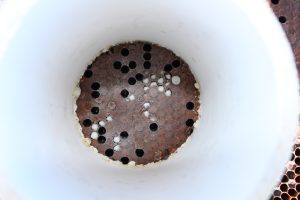
The inside look: capped brood killed by pouring liquid nitrogen inside a PVC pipe for measuring hygienic behavior efficiency of honey bee colonies. Photo by Matthew Hoepfinger, UCD.
A couple of notes of interest. You have probably already heard the name Vairimorpha spp., but this is just a quick reminder that Nosema spp. have been reassigned into this genus based on novel molecular data. If you would like to learn more, here is the original article discussing this research: https://pubmed.ncbi.nlm.nih.gov/31738888/. You also might be wondering, what in the world is UBO? Or maybe you read about it in the past issues of Bee Culture, but here is a quick refresher. Dr. Kaira Wagoner and her colleagues have identified odorous chemicals specifically released by unhealthy (including mite-infested) brood. Based on this, she has developed a short, two-hour assay where she applies chemicals on an area of capped brood and two hours later, checks for uncapping. If you want to learn more, check out this video by Dr. Wagoner: https://www.youtube.com/watch?v=nrA-DK8udus.
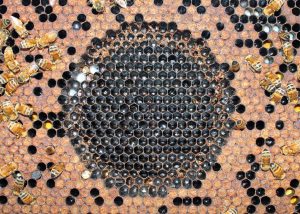
Hygienic assay results: 100% brood removal = 100% hygienic score. Photo by Matthew Hoepfinger, UCD.
In addition to the previous, we are developing plans to offer slightly more specialized services. The Hub has several members who are well trained in instrumental insemination of queens and we plan to incorporate this expertise into our offerings in the near future. Considering Davis is in the middle of bee breeding and queen producing haven, we hope these services will be especially useful to this particular group of beekeepers. In the past, we have collaborated with a number of private companies developing various products for Dr. Neal Williams and his team, who are devising services tailored specifically to producers of other managed bees such as Osmia lignaria. For example, while not yet on our menu, Williams team has the capability to X-ray O. lignaria nests to aid disease diagnosis.
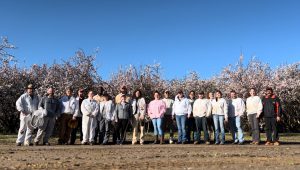
A bonus photo to commemorate a “historic” occasion: field research teams from Oregon State University, Washington State University and University of California Davis gather for a field training day in February 2024 in preparation for colony sampling for a USDA-funded research project tackling all things EFB. Photo by Matthew Hoepfinger, UCD.
Lastly, I wanted to highlight that we are well aware we do not operate in a vacuum and understanding what is happening nationwide is crucial for improving overall honey bee health and of high interest to beekeepers. In collaboration with bee experts at a couple of other Universities, we are creating a bee extension network geared towards helping beekeepers better understand what is happening in their beekeeping operations so they can design optimal management strategies for their operational needs. So stay tuned for future updates from the UC Davis Bee Health Hub and to learn more please visit our website at https://beehealthhub.ucdavis.edu/. As always, let us know if you have any comments or suggestions beehealthhub@ucdavis.edu.

